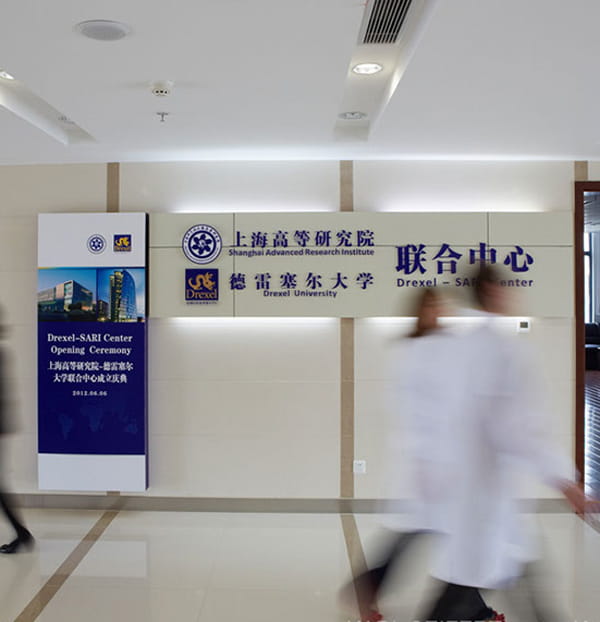SARI Center conference

- No link between acetaminophen use during pregnancy and children's autism risk
- Drexel Recognizes Gregory E. Deavens, CPA, CGMA as Business Leader of the Year
- $15 Million Gift from Howley Foundation Expands Drexel Scholarship Program for Local Graduates
- Drexel’s Pearlstein Gallery Offers Spring Exhibitions Centered on the Healing Properties of Art and Creative Works

The research center formed as a partnership between Drexel University and the Shanghai Advanced Research Institute (SARI) of the Chinese Academy of Sciences in the fall of 2011, will host its first academic symposium on June 3-4. Experts and industry representatives will gather at the Drexel-SARI Center during the two-day, international symposium on Grand Challenges for the Integration of Stem Cells, Nanomaterials and Biomanufacturing to learn about the advances and challenges in the three fields of research.
“We hope to explore interdisciplinary science, novel nanoparticle-enabled biomedical platforms and potential commercialization in nano-medicine and translational regenerative medicine,” said Dr. Wei Sun, director of the Drexel-SARI Center.
Discussion and presentation topics at the symposium will look specifically at recent advances in stem cell, nanomaterials and biomanufacturing research and the use of nanodiamond and other nanoparticle-enabled platforms for drug delivery, tissue engineering, in-vivo imaging and other biomedical applications.
The symposium will also address biomanufacturing of in vitro tissue models with stem cells or nanomaterials for studying diseases, testing drugs and exploring regenerative medicine and new technologies for biomanufacturing, modeling and simulating cells on the nanoscale. And, in keeping with the collaborative spirit of the Center, attendees will look at opportunities to join forces on stem cell, nanomaterial, nanotechnology and biomanufacturing research.
Sun and Dr. Yury Gogotsi, both professors in the College of Engineering, are leading two of the first research collaborations at the Center, which is located in the Shanghai Pudong Science and Technology Park. Gogotsi, Sun and Dr. Lingsong Li, the director of SARI’s Stem Cell and Nano-Medicine Research Center, are co-organizers of the symposium.
“The Drexel-SARI Center allowed us to launch an exciting project on drug delivery with five-nanometer diamond particles, as well as provide undergraduate and doctoral students with research experience in China,” Gogotsi said.
Gogotsi, a distinguished university professor and Trustee Chair and the director of the A.J. Drexel Nanotechnology Institute, is working with his SARI colleagues to expand the study of nanomaterials for biomedical applications. Sun, the Albert Soffa Chair Professor with dual appointments in Drexel’s College of Engineering and the School of Biomedical Engineering, Science and Health Systems, is working with scientists from SARI’s Life Science Department to use 3D cell assembly technology to produce in-vitro cellular models of cancer for drug testing.
Since its inception in October of 2011, the Drexel-SARI Center has generated research collaborations and educational partnerships with SARI and other institutes of the Chinese Academy of Sciences. Four co-op and graduate students have conducted research at the Center over the past year enhancing the work of Gogotsi and Sun.
“This Symposium and collaborative research being conducted at the Center provide an excellent example of Drexel’s approach to enhancing our global impact, an approach based on mutually beneficial sustainable partnerships,” said Dr. Julie Mostov, the vice provost for Global Initiatives.
In This Article
Contact
Drexel News is produced by
University Marketing and Communications.